A Life: Dale “Penny” Breed; ‘Her star shined bright while it was shining’
| Published: 01-09-2023 10:34 AM |
Friends and family members agree that one characteristic permeated nearly every part of longtime Upper Valley resident Dale “Penny” Breed’s life: She did not like being told she couldn’t do something.
Whether it was as an accomplished student and athlete, do-it-all “super” mom, or a pioneering female executive in a male-dominated industry, Breed exhibited an independent streak her entire life, which ended last July at the age of 65 due to early onset Alzheimer’s disease.
“She really just had this attitude that you could do anything you could put your mind to,” the youngest of her three children, Sam Freihofer said. Her oldest child, Will Freihofer, described her as having a “rebelliousness” to her.
That “rebelliousness” manifested itself in numerous ways, but was especially apparent when it came to challenging society’s expectations of what women could and could not do.
“The women’s liberation movement was just kicking off (as she came of age) and she was able to take advantage of every aspect of that,” said Dan Freihofer, her former husband and father of her three children. “She was a brilliant student, good athlete, socially competent and had a drive to her that was admirable. She never let sexism hold her back or put her in a box.”
An archetypal example of Breed’s rebelliousness streak was when — while still a student at Hanover High School — she ran away from home. She moved in with her then boyfriend, who just so happened to be the president of a Dartmouth fraternity that she had met while taking classes at the college.
“She got a job at McDonald’s to pay for herself and meanwhile she’s still getting top grades,” said Sam Freihofer. “It wasn’t like she ran away to do drugs or something like that. She just wanted to be independent and didn’t want anybody telling her what to do.”
After making her point with her parents, she moved back home and eventually matriculated to Dartmouth as a member of the class of ‘79. At the time, women students comprised only about 25% of the student body — Dartmouth had only begun admitting women in 1972 — and the seemingly unequal opportunities available to women on campus drew her ire.
Article continues after...
Yesterday's Most Read Articles
 Homeless Upper Valley couple faces ‘a very tough situation’
Homeless Upper Valley couple faces ‘a very tough situation’
 Lebanon’s Jewell back from auto accident, more aware of ‘drowsy driving’ dangers
Lebanon’s Jewell back from auto accident, more aware of ‘drowsy driving’ dangers
 Plan on track to ship Upper Valley mail to Connecticut for sorting
Plan on track to ship Upper Valley mail to Connecticut for sorting
 West Lebanon crash
West Lebanon crash
 Crane crash on Interstate 89
Crane crash on Interstate 89
The fact that there were no sororities on campus, while fraternities dominated the social scene and gave men many options to choose from, did not seem fair to her. So she wrote the constitutional bylaws and organizational documents that led to Dartmouth’s first sorority.
“It just made sense to her that if there were a group of women who wanted to organize a sorority, they should be able to do it,” said Dan Freihofer.
But just because Breed felt women should be able to form a sorority, didn’t mean that she wanted to be in one. Even though she helped launch the sorority, she did not actually join it herself.
“She had no interest in being in a sorority, but she was interested in being fair (to both sexes),” said longtime friend and fellow Hanover High classmate Ann Sargent.
She also made her mark on campus by being a member of the national champion women’s alpine ski team and the field hockey team, all while maintaining the excellent grades that would later gain her admission to Georgetown University Law Center. After earning her law degree from Georgetown in 1983, she worked in private practice for two years in Washington, until she and Dan Freihofer returned to the Upper Valley and settled in Lyme.
It was at this point that she threw herself into the next phase of her life, being a mother to Will, Sarah and Sam, which like everything else, she excelled at, according to family and friends.
“I am now a mother of two kids and I don’t know how she did it,” said Sarah Henley, Breed’s daughter and middle child. “It’s really mind-blowing.”
Henley recalls with awe how her mom would go more than the extra mile to make holidays and special occasions special for her children. Such as the time when her mom hosted not just a birthday party, but a birthday weekend for 12 of her friends. During the weekend the girls filmed what Henley described as a “feature-length movie,” with Breed doing all of the editing and sending each child home at the end of the weekend with their own VHS copy.
“This was before iMovie or iPhones, but she was really an early adopter of technologies and nobody was doing that kind of filming and editing then,” Henley said. “I think of doing that even now and it just seems insane.”
Sam Freihofer, whose kayaking prowess took him to exotic locales as varied as Mexico, Uganda, Zambia and Chile, remembers Breed as a caring mom who always supported the myriad of interests of her children.
“If I really wanted to do something and I asked for her help, she would help as long as I was serious about it and could explain why I wanted to do it,” he said. “She definitely supported all of us kids being able to travel and pursue whatever we were passionate about.”
That support wasn’t just reserved for her own children. The Breed/Freihofer household was known as a place where all their kids’ friends could and would hang out.
“Her house was always open and visitors were always welcome,” said Laura Robertson, whose friendship with Breed began as fellow classmates at Dartmouth. “Her kids would come home with piles of friends and dinner would just appear for them all.”
At the same time Breed was being super mom, she was also breaking new ground in the business world by forging a career as an executive in an industry not known for being replete with women: the oil industry.
She served as president and CEO of Johnson & Dix Fuel Corp., the family-held energy company that prior to being sold to Irving Oil in 2006 grossed more than $100 million a year.
“There are very few women in the petroleum industry, even today,” said Dan Freihofer.
Typical of Breed, she brought her can-do spirit to the role.
Her friend, Sargent, vividly recalls a time when Breed’s daughter, Sarah, was an infant and the computer mainframe at Johnson & Dix became infected with a computer virus on a Friday. Told that technicians would not be able to arrive until Monday, she took matters into her own hands.
“She was nursing Sarah on one arm and tapping away on her computer with the other,” remembered Robertson with amazement. “Thirty-three years ago, Penny solved a computer virus on her mainframe, on her own, over a weekend.”
The fact that Breed was just “able to figure it out” on her own does not surprise her daughter.
“She just always saw herself as being able to do anything and had this extreme level of confidence in everything that she did and was one of the most competent people in so many different areas,” said Henley. “Part of that was just not ever questioning herself. She brought a level of confidence and mastery of skills to everything.”
That image that family and friends had of Breed — of being able to do anything she set her mind to — made it especially painful when it became clear that she was suffering from Alzheimer’s.
“It was a really slow insidious change that kind of crept up over the years,” Henley recalled with sadness. “For her the disease was a nightmare come true. She was someone who thrived on competency, her ability to live independently and having a certain level of control over her environs. Those are things that defined her life. And to have it fall apart like that I think is the cruelest way someone who is built like that could possibly go.”
A person who once cherished social interactions and learning new things, retreated inward, lost touch of friends and largely limited herself to the friendly confines of the garden at her Etna home, friends and family say.
“One of the fundamental things about Alzheimer’s is that you have less and less ability to handle the unfamiliar,” said Dan Freihofer, who remained in touch with Breed in the years after their divorce. “You can’t remember that person’s name and it drives you so crazy that you just start choosing to avoid those situations.”
But as much sadness, pain and frustration as the disease caused, there were two silver linings amid the family ordeal.
Once she was diagnosed with Alzheimer’s, her children, who at the time all lived out West, circled the wagons and moved closer to home to care for her. Sam Freihofer moved in with her to provide care for a crucial four-year stretch, Will Freihofer returned to the Upper Valley and Henley moved back east as well.
“It was a horrible situation, but her kids were amazing, every one of them,” recalls Sargent. “They all moved home, they spared no expense and they had no selfishness around what it would cost to take care of their mother. It’s not that common to see all the kids react like that.”
And most enduringly to the memories of family and friends, there was a “golden window” of time when Breed, freed by the disease from her responsibilities of super mom and high-performing executive, rediscovered her youthful exuberance, embracing many of the outdoor activities that she loved and excelled at in her younger years.
“She had this real passion for outdoor recreation when she was young, but then for a long time she was a mom and this businesswoman,” said Will Freihofer. “As it progressed it was really fun because she became more active and did a lot of outdoorsy stuff that brought back that joyful, youthful energy and that was really cool.”
Outdoor adventures with her children included “just bombing cross country skis on the most absurd hills,” hiking, and reporting with pride after a ski trip to Killington that Will couldn’t keep up with her — even though the real story was that Breed unwittingly took a wrong turn and Will, who was skiing in front of her, had to hike back up the hill try to catch up to her.
“There was this turning point where the analytical part of her brain completely shut off and turned back into a childlike curiosity,” remembered Sam Freihofer. “She was happier, and more relaxed, all the weight of her life (…) she was just freed from all that crap.”
“Visiting her in the last five years of her life as I did from time to time, she had that little impish twinkle in her eye that I remember when we met in 1978, 45 years ago when we were college sweethearts,” recalled Dan Freihofer. “I saw flashes of that at the end.”
And the end did come, as it was always going to do no matter how much the family rallied around her and how many heartfelt memories were created in the final years.
But even though Breed’s battle with Alzheimer’s ended on July 7, 2022, her impact did not.
“She had a large influence on a lot of people in the area and she was a champion of the Upper Valley,” said Will Freihofer. “This was her spot and her story had an arc to it, but she never was unwavering in loving the Upper Valley and being a really good parent, friend and community member to anyone who knew her.”
“Her star shined bright while it was shining,” Dan Freihofer said.
Justin Campfield can be reached at jhcampfield@gmail.com.
CORRECTION: Dale "Penny" Breed's daughter, Sarah Henley, is her middle child. A previous version of this story was incorrect in the birth order of Breed's children.

 Kenyon: Constitutional rights should trump Dartmouth’s private interests
Kenyon: Constitutional rights should trump Dartmouth’s private interests
